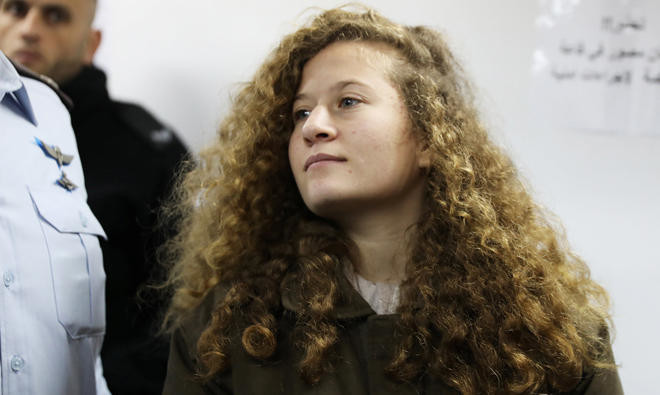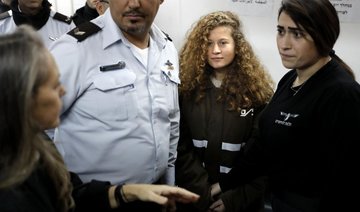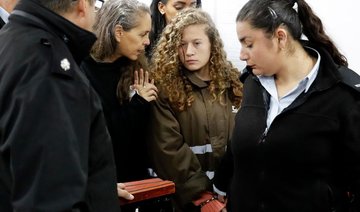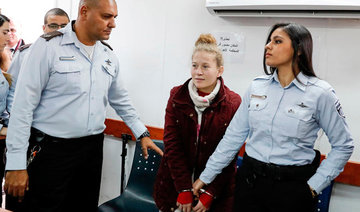JERUSALEM: A senior Israeli official on Wednesday said he led a secret investigation into 16-year-old Palestinian protest icon Ahed Tamimi and her family, in part because their appearance — including “blond-haired, freckled” children in “Western clothes” — made them seem less like “real” Palestinians.
The stunning comments by Michael Oren, a deputy minister and former ambassador to the US, promptly drew accusations of racism from the family — the latest twist in a case that has turned into a public relations headache for Israel.
The case revolves around Israel’s handling of Ahed Tamimi, who was arrested on Dec. 19 for slapping two Israeli soldiers outside her West Bank home four days earlier.
Video of the scuffle quickly spread, giving Ahed worldwide attention. The girl, noticeable for her long blond curls, and her mother are now being held in jail. Ahed faces charges that carry up to 14 years in prison.
Oren told The Associated Press that he had led a classified parliamentary investigation into the Tamimis two years ago in which Israeli security agencies and diplomats participated.
The family has a long history of leading protests against Israeli policies in the West Bank that often turn into clashes with soldiers in their village of Nabi Saleh and Ahed has been involved in highly publicized scuffles with soldiers in the past.
Oren said his investigation looked into whether the protests were genuine or whether the family members were provocateurs, paid to send children to clash with soldiers.
Derisively calling the skirmishes caught on tape “Pallywood,” Oren claimed that “someone” was funding the unrest to harm Israel’s image, without providing evidence.
“The Tamimi family and those claiming to be part of the Tamimi family have been provoking Israeli soldiers for many, many years now,” he said. “The children were chosen on the basis of their external look, to look Western, freckled, and blond-haired.”
“They were dressed as Westerners,” he added. “They don’t dress the way children dress in the West Bank, for a very specific purpose: To get soldiers to react violently to them, to take pictures of this violence and to spread it around the world in order to delegitimize, discredit the state of Israel.”
He called it a “very sophisticated operation” that has succeeded in manipulating the Western press.
In an interview with Israeli Channel 10 TV, Oren claimed one boy appeared in different videos with a cast on one arm at one protest, and on his other arm at another protest, before disappearing from demonstrations altogether.
In a statement from his office, Oren said: “In discussions held in the committee, the issue of the family’s credibility was raised and if it really is a real family.”
Ahed’s father, Bassem Tamimi, called Oren’s investigation “silly and stupid” and said the investigation was racist.
“We, the Tamimi family, were here in Palestine before the creation of Israel, and we will stay,” he said. “Denying that Palestinians could be blond reflects racism in the Israeli society.”
Ahed has been celebrated by Palestinians as a national hero, and Israel’s treatment of her has drawn the attention of international activists, human rights groups and UN officials.
In the Dec. 15 video, she is seen approaching two soldiers standing outside her home. She yells at them, tells them to leave, then kicks and slaps them as they stand silently.
The family says the girl was upset because a young cousin had been shot in the head and seriously wounded with a rubber bullet fired by Israeli troops. But the altercation drew outrage in Israel over what some had seen as a humiliation of the military.
In a reflection of the tensions, Israel’s Defense Minister Avigdor Lieberman ordered the popular Army Radio station to ban any songs composed by Yehonatan Geffen, a leading journalist and songwriter, because of a poem he published that praised Ahed. Israel’s attorney general ruled that Lieberman has no authority over the station’s programming.
Opposition lawmaker Nachman Shai, a former chief military spokesman who is often critical of the government, acknowledged that the incident has become part of the war for the “hearts and minds” of people around the world.
But he said Israel had no choice in how to handle the case.
“She does not deserve to return home as if nothing happened,” he said. “You cannot ignore it, because that will cause other Palestinians to follow her.”
Tamimi was arrested in an overnight raid on Dec. 19, and her mother was arrested when she visited her daughter at a police station.
An Israeli military court has ordered they both be held for the duration of their trial — a process that is expected to take months. Ahed has been charged with 12 counts of attacking soldiers in five incidents going back to April 2016, while her mother has been charged with incitement. A cousin arrested with Ahed has been released on bail.
The family lawyer, Gaby Lasky, said the trial is scheduled to begin on Jan. 31, Ahed’s 17th birthday. She said she was hopeful the prosecutors would not seek the maximum 14-year sentence for the girl and would agree to a reduced sentence of several months.
Ahed is currently being held in a special prison wing for minors, where her conditions have improved, Lasky said. For the first week while she was interrogated, she said Ahed was not provided with a change of clothes or a coat, and threatened with the arrests of other family members if she did not talk.
Asked about Oren’s investigation, she said she was “ashamed” to hear a parliamentary committee was dealing with “wild conspiracy theories.”
Israel official doubted Palestinian protest icon, her family
Israel official doubted Palestinian protest icon, her family

US says supports gas deals with Kurdistan region after Iraq lawsuit

- “We encourage Baghdad and Irbil to work together to expand domestic gas production as soon as possible
WASHINGTON: The United States said Tuesday it supported American energy companies’ contracts with Iraq’s autonomous Kurdish region after the Iraqi government filed a lawsuit against them.
Regional prime minister Masrour Barzani announced the signing of the two deals valued at tens of billions of dollars during a visit to Washington, in which he met Friday with Secretary of State Marco Rubio.
Rubio in his meeting “commended” the deals with US companies, State Department spokeswoman Tammy Bruce told reporters.
“We encourage Baghdad and Irbil to work together to expand domestic gas production as soon as possible. These types of economic partnerships will benefit both the American and Iraqi peoples and help Iraq move toward energy independence,” she said.
“We also believe that US and Iraqi interests are best served by having a strong, resilient Iraqi Kurdistan region within a sovereign and prosperous federal Iraq
“As far as the nature of the lawsuits, obviously we are looking forward to continuing these kinds of deals. We expect these kinds of deals to flourish, and expect and would hope that they would be facilitated,” she said.
Israeli troops fire warning shots as Palestinians overwhelm new Gaza food center

- The UN and other humanitarian organizations have rejected the new system, saying it won’t be able to meet the needs of Gaza’s 2.3 million people
MUWASI, Gaza Strip: Chaos erupted on the second day of aid operations by a new US-backed group in Gaza as desperate Palestinians overwhelmed a center distributing food on Tuesday, breaking through fences. Nearby Israeli troops fired warning shots, sending people fleeing in panic.
An AP journalist heard Israeli tank and gunfire and saw a military helicopter firing flares. The Israeli military said its troops fired the warning shots in the area outside the center and that “control over the situation was established.”
At least three injured Palestinians were seen by The Associated Press being brought from the scene, one of them bleeding from his leg.
The distribution hub outside Gaza’s southernmost city of Rafah had been opened the day before by the Gaza Humanitarian Foundation, which has been slated by Israel to take over aid operations. The UN and other humanitarian organizations have rejected the new system, saying it won’t be able to meet the needs of Gaza’s 2.3 million people and allows Israel to use food as a weapon to control the population. They have also warned of the risk of friction between Israeli troops and people seeking supplies.
Palestinians have become desperate for food after nearly three months of Israeli blockade pushed Gaza to the brink of famine.
Palestinians walk miles for food, finding chaos
Palestinians at the scene told AP that small numbers of people made their way to the GHF center Tuesday morning and received food boxes. As word spread, large numbers of men, women and children walked for several miles from the sprawling tent camps along Gaza’s Mediterranean coast. To reach the hub, they had to pass through nearby Israeli military positions.
By the afternoon, hundreds of thousands were massed at the hub. Videos show the crowds funneled in long lines through chain-link fence passages. Two people said each person was searched and had their faces scanned for identification before being allowed to receive the boxes. Crowds swelled and turmoil erupted, with people tearing down fences and grabbing boxes. The staff at the site were forced to flee, they said.
The AP journalist positioned some distance away heard gunfire and rounds of tank fire. Smoke could be seen rising from where one round impacted. He saw a military helicopter overhead firing flares.
“There was no order, the people rushed to take, there was shooting, and we fled,” said Hosni Abu Amra, who had been waiting to receive aid. “We fled without taking anything that would help us get through this hunger.”
“It was chaos,” said Ahmed Abu Taha, who said he heard gunfire and saw Israeli military aircraft overhead. “People were panicked.”
Crowds were seen running from the site. A few managed to secure aid boxes — containing basic items like sugar, flour, pasta and tahini — but the vast majority left empty-handed.
US-backed group says they ‘fell back’ to ensure safety
In a statement, GHF said that because of the large number of Palestinians seeking aid, staff at the hub followed the group’s safety protocols and “fell back” to allow them to dissipate, then later resumed operations.
A spokesperson for the group told the AP that no shots were fired from GHF. Speaking on condition of anonymity in line with the group’s rules, the spokesperson said the protocols aim at “avoiding loss of life, which is exactly what happened.”
GHF uses armed private contractors to guard the hubs and the transportation of supplies. The hub is also close to Israeli military positions in the Morag Corridor, a band of territory across the breadth of Gaza that divides Rafah from the rest of the territory.
GHF has set up four hubs around Gaza to distribute food, two of which began operating on Monday — both of them in the Rafah area.
The UN and other humanitarian groups have refused to participate in GHF’s system, saying it violates humanitarian principles. They say it can be used by Israel to forcibly displace the population by requiring them to move near the few distribution hubs or else face starvation – a violation of international law. They have also opposed the use of facial recognition to vet recipients.
Israeli Prime Minister Benjamin Netanyahu on Tuesday commented on the turmoil at the Rafah center, saying, “There was some loss of control momentarily … happily we brought it under control.”
He repeated that Israel plans to move Gaza’s entire population to a “sterile zone” at the southern end of the territory while troops fight Hamas elsewhere.
UN says it has been struggling to transport aid
Israel has said the new system is necessary because it claims Hamas has been siphoning off supplies that reach Gaza. The UN has denied that any significant diversion takes place.
Throughout the war, the UN and other aid groups have conducted a massive operation distributing food, medicine and other supplies to wherever Palestinians are located. Israel says GHF will replace that network, but the past week has allowed a trickle of aid to enter Gaza for the UN to distribute.
COGAT, the Israeli military agency in charge of coordinating aid, said on Tuesday that 400 trucks of supplies, mainly food, was waiting on the Gaza side of the main crossing from Israel, but that the UN had not collected them. It said Israel has extended the times for collection and expanded the routes that the UN can use inside Gaza.
Jens Laerke, spokesperson for the UN humanitarian office OCHA, told reporters in Geneva that agencies have struggled to pick up the supplies “because of the insecure routes that are being assigned to us by the Israeli authorities to use.” He said the amount of aid allowed the past week was “vastly insufficient.”
Israeli strike on south Lebanon kills one: ministry

- The ministry said an “Israeli enemy strike” on a motorcycle killed one man in Yater
- The Israeli military did not immediately comment on the attack
BEIRUT: Lebanon’s health ministry said an Israeli strike on south Lebanon killed one man on Tuesday, the latest attack despite a ceasefire between Israel and Iran-backed Hezbollah.
In a statement, the ministry said an “Israeli enemy strike” on a motorcycle killed one man in Yater, in south Lebanon’s Bint Jbeil district.
The Israeli military did not immediately comment on the attack, which came after it said it killed a Hezbollah member in south Lebanon’s Majdal Zoun on Monday.
Israel has continued to launch strikes on its northern neighbor despite the November truce that sought to halt more than a year of hostilities with Hezbollah, including two months of full-blown war.
Under the terms of the ceasefire deal, only UN peacekeepers and the Lebanese army should be deployed in southern Lebanon, though Israel has kept its forces in five areas it has declared strategic.
Lebanon has called on the international community to pressure Israel to end its attacks and withdraw all its troops.
UN says it has no information over Gaza aid group deliveries

GENEVA: The United Nations said on Tuesday it had no information on whether the Gaza Humanitarian Foundation, a US-backed aid group, had actually delivered any supplies inside the war-ravaged Palestinian territory.
The little-known group, which has stirred controversy since surfacing in early May, announced on Monday it had begun distributing truckloads of food in the Gaza Strip.
But officials from the UN humanitarian agency OCHA, and UNRWA, the UN agency for Palestinian refugees, said they were unaware whether any aid had actually been distributed.
The UN and international aid agencies have said they will not cooperate with the GHF, amid accusations it is working with Israel without any Palestinian involvement.
“It is a distraction from what is actually needed, which is a reopening of all the crossings in to Gaza; a secure environment within Gaza; and faster facilitation of permissions and final approvals of all the emergency supplies that we have just outside the border that need to get in,” OCHA spokesman Jens Laerke told a press briefing in Geneva.
UNRWA spokeswoman Juliette Touma told journalists aid to Gaza was still “very, very far” from what was needed: a minimum of 500 to 600 trucks per day loaded with food, medical aid, fuel, water and other basic supplies, she said, speaking via video-link from Amman.
Israel, which recently stepped up its offensive against militant group Hamas, drew international condemnation after implementing a blockade on March 2 that has sparked severe food and medical shortages.
Humanitarian aid has begun trickling back into Gaza in recent days after Israel lifted the 11-week blockade.
Touma said no UNRWA supplies had gone in since March 2, while Laerke said he had no information on how many UN trucks had passed through the Kerem Shalom crossing in the last 24 hours, partly because Israel does not allow them to have a fixed presence there.
Israeli forces raid foreign exchange stores across West Bank

- One killed, eight other people were injured by Israeli forces during a raid in Nablus
RAMALLAH: Israeli forces raided foreign exchange stores in several West Bank cities including Ramallah and Nablus on Tuesday, accusing their parent company of “connections with terrorist organizations,” according to an army closure notice.
“Israeli forces are taking action against Al-Khaleej Exchange Company due to its connections with terrorist organizations,” a leaflet left at the company’s Ramallah location read.
An AFP journalist present at the scene reported several army vehicles at the store’s entrance while soldiers came out carrying items covered by a cloth.
Two army vehicles escorted one of the store’s employees away from the premises.
In the northern West Bank city of Nablus, Israeli forces raided a second foreign exchange store belonging to the Al-Khaleej company, as well as a gold store, according to another AFP journalist.
Some Palestinian residents of Nablus were seen clashing with the army during the raid, throwing objects at troops.
The Ramallah-based Ministry of Health said one man was killed and eight other people were injured by Israeli forces’ live ammunition during a raid in Nablus on Tuesday.
The Palestinian Red Crescent said it treated 20 people for tear gas inhalation and three others who were injured by rubber bullets.
The Palestinian movement Hamas condemned the raids on foreign exchange shops.
“These assaults on economic institutions, accompanied by the looting of large sums of money and the confiscation of property, are an extension of the piracy policies adopted by the (Israeli) government,” the group said in a statement, adding that the targeted companies were “operating within the law.”






















